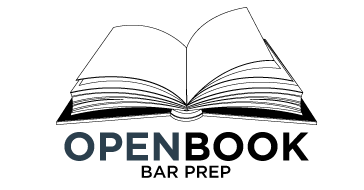
Baby Bar Exam
The First-Year Law Students’ Examination (FYLSE), more popularly known as the “Baby Bar,” is a requirement for first year law students enrolled at an unaccredited law school. Baby Bar graders speak the same language as the bar exam grader: the language of relevance, not memorization.
The Baby Bar provides many concealed benefits for first-year law students. While many, students consider this exam to be an annoyance, it is certainly an asset. The FYLSE earned the nickname Baby Bar because it is exactly like the bar exam, on a smaller scale. Students receive one hour to complete essays, just like on the bar exam. Further, the Baby Bar is timed exactly like the bar exam, creating advantageous test-taking practice. Finally, like the bar exam, the Baby Bar is scored based upon application of the law; not specific knowledge of the law.
The Open Book Bar Prep philosophy remains constant; analyze the law, do not memorize it. Our Baby Bar course is accurately based on the State Bar’s expectations. Our course concentrates solely on the three subjects tested on the exam: torts, criminal law and contracts.
The foundation of this course is one-on-one attention. All practice essays and multiple- choice quizzes are thoroughly evaluated with our teaching staff. The one-on-one attention that students receive is vital to helping them comprehend and retain all pertinent information. We provide every student with the devotion necessary to grasp crucial ideas and concepts. The one-on-one relationship also prevents students from misunderstanding a small idea or theory, which could otherwise lead to greater confusion.
Our course is taught from a positive perspective by highlighting the many benefits to taking the Baby Bar. Students will learn exactly what the bar graders require years before other law students, giving them the tools to pass the Baby Bar, as well as a head start towards passing the bar exam.
The goal of this course is not only to ensure our students pass the Baby Bar with flying colors, but also to train the legal mind to distinguish the difference between application and memorization of the laws. Once students realize the division between application and memorization, the exam transforms into an Open Book exam. With these important distinctions, students will enter the exam with confidence, knowing that all the necessary information is either in their mind or on the test. This is the “Open Book Effect.”




